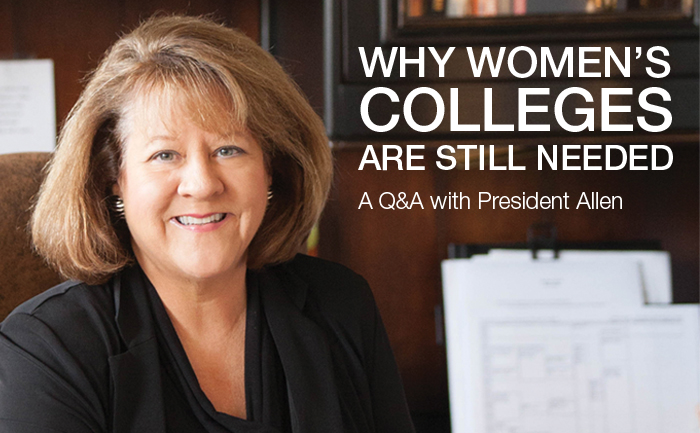Why Women’s Colleges Are Still Needed
- By Gaye Hill
- Published

As Dr. Jo Allen, ’80, enters her fifth year as president of Meredith College, the institution is approaching the 125th anniversary of its founding and preparing to enter the public phase of its largest fundraising campaign in history. Meredith Magazine staff sat down with Dr. Allen recently to discuss Meredith’s bright future, the continued importance of women’s education, how the College has remained strong when other women’s colleges have failed or gone co-ed, and the need for widespread support by Meredith alumnae and friends.
MM: Why do we still need women’s colleges?
JA: When women’s colleges were established, women didn’t have access to higher education. Now, of course, the conversation has shifted – it’s not about access anymore, it’s about women’s success.
The strong outcomes are undeniable. Women who go to women’s colleges are more likely to take on leadership roles and be recognized in corporate and political circles; they experience higher job satisfaction; they’re more likely to go to graduate school; and they pass those benefits on to their children.
That being said, women’s colleges have to be ready and eager to change. Years ago the key outcome was to provide a college education, most frequently in the arts and humanities. Today women’s colleges are more involved in science, technology, engineering, and mathematics (STEM) subjects than ever – and we teach those subjects differently, through collaborative methodology. We know that’s the way women learn and how they lead. Understanding more about women as learners helps us to understand how to teach them so that they get the greatest success out of the classroom and the college experience. Faculty at co-ed institutions teach to both genders so it can be a hodgepodge of learning styles. At a women’s college, we get to narrow that down somewhat and go with our strengths.
MM: What are some of the ways Meredith has changed that have allowed her to remain relevant? 
JA: Sometimes circumstances require you to change and become something different. Other times change requires you to recommit to what you are. That’s what we’ve done here at Meredith – and it was based on extensive research and an open and transparent conversation about
who we are and what we’re good at. We built a strategic plan based on that research, and have continued to assess how we’re doing by looking at hard data and asking tough questions. That’s another part of our change: we became more disciplined.
Adding StrongPoints® is an exciting, and relatively recent, change for us. Overall, StrongPoints helps our students develop the ability to plan, which is a critical life skill that helps women intentionally build the lives they want. All too often, we fail to plan what we want to learn, what we want to do beyond class, how we will manage our money, and how we will shape our careers. StrongPoints is a great way for us to coach women and help them gain much-needed skills.
MM: What questions are you frequently asked by Meredith alumnae?
JA: The number one question I’m asked is “Are we going co-ed?” I always tell alumnae, I never say “never,” but I see absolutely no reason for us to consider going co-ed. I think it would hurt us. We’d lose our niche, our culture, and our sense of identity. Further, when you consider what we’d have to do to go co-ed – the alterations needed in residence halls, in athletics – it’s a huge, and costly, change on campus. I really don’t see it being a help.
Our alumnae know the tremendous work we do in building the intellectual and social self-confidence of women, but they also know that the number of women’s colleges is diminishing. I would hope that every one of our alumnae would say, “This is a debt I need to repay for the next generation,” and commit to supporting Meredith at a sustainable level.
MM: What are you asked by Meredith’s donors?
JA: The best question I get from donors is “What do you need?” Sometimes it’s difficult to answer because we have so many different needs. We need money to repair roofs and sidewalks, to make a major renovation, to keep a top faculty member, to invest in a staff position.
As our needs change and evolve, we need flexibility more than anything. When people give unrestricted gifts to Meredith, that is the greatest honor. We’re always happy to tell donors where we’ve spent the money, or to tell them up front. But their giving us some room to address what we really need is wonderful.
MM: What do employers say about our graduates? 
JA: They have a phenomenal work ethic. They are ready to go to work, and they know what to do. Employers can give them a job, a project, an assignment – and it’s taken care of. Unsurprisingly, the thing I hear more than anything else is “I’d like to hire more Meredith graduates.” It makes me so proud.
MM: Why do we need the Beyond Strong campaign?
JA: A campaign is a visible way to talk about the needs of the College and to create some urgency in acting. We have to talk about decreased support from the state and federal government in the face of the reality that expenses are rising. Everybody loves this beautiful campus, as do I, but it is an expensive piece of real estate to maintain.
There’s also an increased need for scholarships. Families are less capable of paying the full price and they need help. Set all of that in the context of the national commitment to have more college graduates – and something’s got to give. The Beyond Strong campaign will also shore up and replace the funds that were lost in the Great Recession. Like most other institutions, we lost almost a third of our endowment in 2008-09.
MM: What are you most excited about?
JA: I’m excited that our brand, Meredith College | Going Strong, has rung so true for so many people. It’s the authenticity. When people hear it, they know immediately that it is an accurate statement about Meredith. It’s not a wish but a proclamation of truth.
When you know yourself and your institution that well, it gives you a lot of freedom to talk about the future – to weigh different ideas, to try some things that you might not have tried – all in keeping with our commitment to building strengths. Stronger U is a great example; we have an opportunity to touch the wider community with a focus that is uniquely Meredith through that concentration on strength.
Once you start seeing all the different ways we could talk about strengths and build research agendas and curricula and partnerships, all kinds of learning opportunities that make individuals, communities, corporations, non-profits stronger – you realize this is actually our pathway into the true social contract that higher education is supposed to have with the nation. This is far beyond what we do for an individual student. This is what we’re doing to make Raleigh, North Carolina, our country, and the world better – because they all need strong women to be able to become stronger.
Globally, the weakest countries are those where women cannot succeed. The strongest countries are those where women have positions of influence and power, have a voice, and have an economic, political, or artistic standing.
MM: What are you most concerned about?
JA: Forces outside of Meredith have such an impact on us. What’s happening with regulations and compliance, for example – very little that we do in response to recent mandates has made us a better institution, but those mandates are eating our resources.
I’m concerned about the legislature and the federal government making decisions about higher education without doing their homework. There seems a startling willingness to make laws based on anecdotal evidence. We have all sorts of data and evidence about the value of a college education and yet there are these voices out there arguing otherwise.
When I think about the future, not just of Meredith but of humanity, I can’t help but feel that the solution lies with women. If women are increasingly devalued and pushed away from the table, we have to figure out how to reverse that. I well remember a conversation I had with a mentor when I told him my goal was to become tougher without becoming hard. I think that is the kind of distinction women have to make before they can fully build the lives they want and take their places in key leadership positions.
MM: Why should a young woman choose to come to Meredith?
JA: Our reputation for excellence ensures that she’ll graduate with a widely-recognized, high-quality degree. Our focus on strengths is critical because it personalizes the Meredith experience, and that individualized piece is very tangible thanks to StrongPoints.
In addition, she’ll be in a supportive environment. She’ll have faculty and friends who are cheering for her and who are here for her if she stumbles – it’s a lifelong benefit that’s a part of the Meredith story. I spent 25 years at other institutions. When you ask most people if they’re in touch with anyone from their college days they might say, “one or two”. Here the number of women who stay in touch is really quite amazing. They have history together.
In fact, I just celebrated my 35th reunion with my classmates from the Class of 1980. It is just stunning to me how many of us remember each other so well – know each other’s story – and care enough to stay in contact through the years. Life is hard enough even with friends like this – I can’t imagine having nearly as strong a life without them!
MM: What are Meredith’s strengths?
JA: An excellent reputation that has never been questioned. Our location. It has always been great to be in Raleigh, and the city and area’s reputation is increasingly positive. Meredith has a fine menu of curricular offerings built with outstanding faculty and staff who make the quality of programs readily evident. Our size is another important feature. It helps us economically to be a larger women’s college.
We have a clear vision and plan for the future, a healthy morale. We’re using strengths with our students to build their self-confidence, their creativity, their goals. As an institution, Meredith has done the same thing. We’re using our strengths and are willing to set our sights high, expect good things for ourselves, and work hard to make them come true.
MM: What is your vision for the next 125 years?
JA: To continue going strong. Our strengths are going to evolve, and I want us to recognize that changes in society require us to apply our strengths in new ways that will make us even stronger. We will continue to demonstrate a capacity for change within the context of our strengths and not try to be something we’re not. I think there are enough people out there who have voiced appreciation and who will hold us accountable to change in ways that honor our strengths.
News Director
316 Johnson Hall
(919) 760-8087
Fax: (919) 760-8330


3800 Hillsborough Street Raleigh, NC 27607-5298 | (919) 760-8600 Fax: (919) 760-8330 | © 2022 All Rights Reserved.